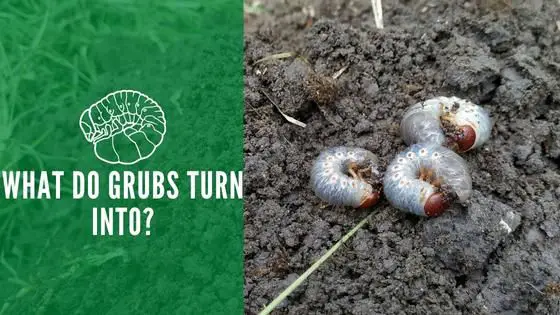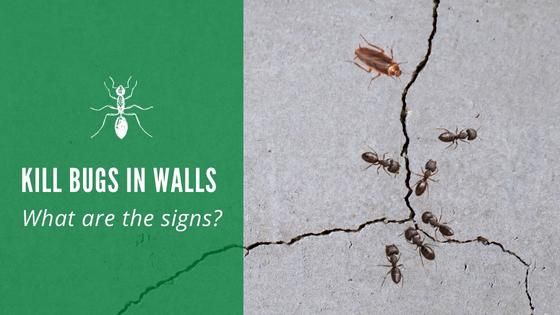Bugs That Come Out After the Rain
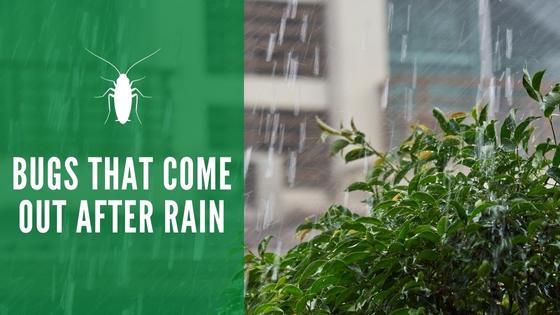
Have you ever noticed that the sweet scent of a recent rainstorm always seems to bring on a swarm of bugs? Moisture-loving insects often come out in droves following periods of rain, even if it’s just a shower. Understanding why they appear after a storm helps keep your house pest-free, rain or shine.
Why Do Bugs Come Out In the Rain?
Many bugs love humidity, and the recent rain generates the perfect conditions for insects to engage in their favorite activities. The reason why you see certain bugs after a rainstorm depends upon the type and its needs, but those swarms usually happen for these common reasons.
Their Nests Fill Up With Water
Most insects prefer to live outside, and you might never see some of their nests when they exist underground or behind the eaves of your house. However, even the most carefully hidden nest is subject to potential flooding during a storm. If an ant bed or wasp hive fills up with water, those bugs will run out to look for somewhere safer.
Fewer Predators Are Out
Speaking of safety, the majority of insects have some great survival skills. During heavy rain, birds and other potential predators often hunker down in dry places. With fewer animals out prowling for prey, the insects can crawl and fly around with greater freedom. Plus, you’ll naturally see more bugs when they aren’t being eaten.
They’re Eager to Breed
For some insects, the increase in humidity is a sign that it is time to get out and mate. Subterranean termites are especially known for emerging from their underground nests to reproduce. If you spot these bugs after a storm, you’ll need to take prompt action to protect your property.
Flying Bugs That Come Out After the Rain
Once the rain stops, flying insects can resume their activities because their wings are dry. You’ll want to keep an eye out for these insects that tend to be extra pesky after the rain clears.
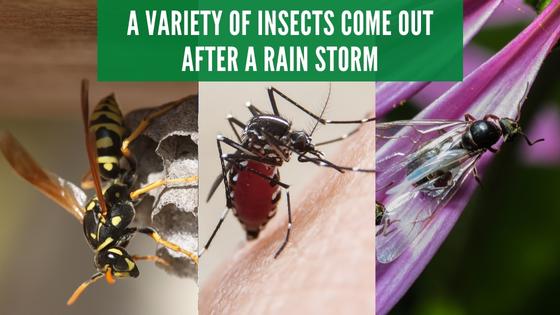
Ants
Winged ants are in their reproductive stage. Like termites, these winged insects fly in swarms as they look for a mate. Flying ant swarms are especially known for occurring in the late spring and summer months.
Wasps
A rainstorm might bring brief relief from dealing with these stinging pests, but it only lasts until the rain stops. Wasps stay in their nest to avoid getting wet, which can mean going without food until a storm passes. Once it does, the wasps fly out in full force to compensate for lost foraging time.
Mosquitoes
Mosquitoes are known for buzzing around after rainy weather. Since mosquitoes lay their eggs in pools of water, the rain creates the perfect breeding grounds. Unfortunately, even a bottle cap filled with water is enough for hundreds of mosquitoes to breed, which can lead to large populations during the rainy season.
Other Common Insects That Come Out After Rain
As you might suspect, the rain on the ground also disrupts the crawling bugs. You might see some bugs scramble for dry ground before and during a rainstorm. Later, they may start crawling to return to their nests or build new ones. Crawling bugs are especially notorious for going through cracks to get into buildings to escape the rain.
Cockroaches
Roaches love moist areas where they can find decaying organic material to feed on. Cockroaches also live in sewers and other plumbing lines that they must flee from to avoid drowning during heavy rain. As the water clears, some will head back to where they came from, but others might find a safer place to nest.
Grubs and Worms
People often assume that worms rise to the ground’s surface to avoid drowning, but new theories suggest that this might not always be true. Some scientists believe the rain hitting the earth sounds like a predator’s movements. Others speculate that worms use the moist ground to travel longer distances faster.
Centipedes
These pests aren’t most people’s favorite insects to find in the house, but they at least have a good reason for appearing after the rain. Centipedes feed on those other bugs that you see running around. All the rain did was expand their hunting grounds.
Spiders
While the centipedes handle the bugs running on the ground, spiders often choose to look for the ones flying high. Spiders naturally know that insects will be out in abundance, which makes it the perfect opportunity to make a fresh web.
Keeping Bugs Out of Your House
Pest infestations tend to rise anytime there are major changes in the weather. Staying vigilant before and after a rainstorm helps you avoid dealing with a major bug invasion.
Keep Windows and Doors Shut After Rainstorms
Sure, the fresh air might feel cooler and smell amazing, but opening doors and windows invite bugs to come inside. If you still prefer to have them open, then make sure to install screens and check them periodically to make sure they are still in good condition. Even a small hole in a screen can let an insect get inside.
Make Sure Water Drains Away From Your House
That little bottle cap that can house mosquito larvae can also seem appealing to insects that need a drink of water. Too much moisture around the house can also lead to rotting wood and other conditions that attract insects.
After the rain stops, ensure that the water isn’t pooling around your property’s exterior. If necessary, shake off plants, lawn furniture, and other items that tend to collect water.
Use Larvicides to Control Mosquitoes
Larvicides are specifically designed to control mosquito populations. Ideally, you should keep water containers covered outside, but this might not be possible with ponds, fountains, and other aquatic features.
If you can’t create a mosquito barrier, dropping larvicide into non-drinking water stops breeding. When you choose to use a larvicide, read the instructions and only use ones safe around humans and pets in pools and other areas where you might have contact with the water.
Create a Preventative Barrier
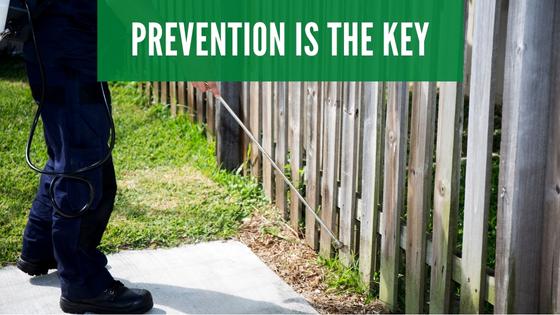
Most of the time, an insect that appears in your house after a rainstorm is just trying to survive. Naturally, keeping insect populations down around your property, in general, is the best way to avoid having them become a post-rain problem.
Perimeter spraying can be done both inside and outside of your property. Although a bug might cross the invisible spray line, it won’t survive long if they manage to get into your house. They’ll also die before they can breed so that the problem doesn’t continue to spread.
Creating a preventative barrier around your house may also involve cleaning up. Keeping mulch, firewood, and other organic materials away from the exterior walls prevents bugs from hanging out where they may just make a run for the safety of your home’s dry floors during a sudden downpour.

